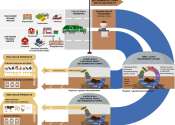A patent is a set of exclusive rights granted by a state to an inventor or his assignee for a limited period of time in exchange for a disclosure of an invention.
The procedure for granting patents, the requirements placed on the patentee and the extent of the exclusive rights vary widely between countries according to national laws and international agreements. Typically, however, a patent application must include one or more claims defining the invention which must be new, inventive, and useful or industrially applicable. In many countries, certain subject areas are excluded from patents, such as business methods and mental acts. The exclusive right granted to a patentee in most countries is the right to prevent others from making, using, selling, or distributing the patented invention without permission.
Under the World Trade Organization's (WTO) Agreement on Trade-Related Aspects of Intellectual Property Rights, patents should be available in WTO member states for any inventions, in all fields of technology, and the term of protection available should be minimum twenty years. Different types of patents may have varying patent terms (i.e., durations).









